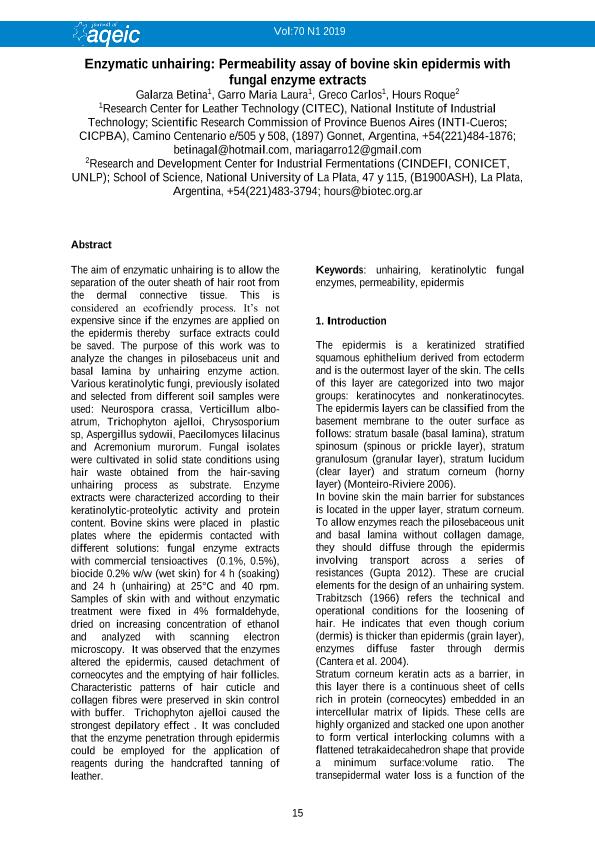Mostrar el registro sencillo del ítem
dc.contributor.author
Galarza, Betina Claudia

dc.contributor.author
Garro, María Laura

dc.contributor.author
Greco, Carlos A.
dc.contributor.author
Hours, Roque Alberto

dc.date.available
2021-01-13T20:05:30Z
dc.date.issued
2019-07
dc.identifier.citation
Galarza, Betina Claudia; Garro, María Laura; Greco, Carlos A.; Hours, Roque Alberto; Enzymatic unhairing: Permeability assay of bovine skin epidermis with fungal enzyme extracts; Asociación Química Española de la Industria del Cuero; Journal of AQEIC; 70; 1; 7-2019; 15-21
dc.identifier.uri
http://hdl.handle.net/11336/122652
dc.description.abstract
The aim of enzymatic unhairing is to allow the separation of the outer sheath of hair root from the dermal connective tissue. This is considered an ecofriendly process. It?s not expensive since if the enzymes are applied on the epidermis thereby surface extracts could be saved. The purpose of this work was to analyze the changes in pilosebaceus unit and basal lamina by unhairing enzyme action. Various keratinolytic fungi, previously isolated and selected from different soil samples were used: Neurospora crassa, Verticillum albo-atrum, Trichophyton ajelloi, Chrysosporium sp, Aspergillus sydowii, Paecilomyces lilacinus and Acremonium murorum. Fungal isolates were cultivated in solid state conditions using hair waste obtained from the hair-saving unhairing process as substrate. Enzyme extracts were characterized according to their keratinolytic-proteolytic activity and protein content. Bovine skins were placed in plastic plates where the epidermis contacted with different solutions: fungal enzyme extracts with commercial tensioactives (0.1%, 0.5%), biocide 0.2% w/w (wet skin) for 4 h (soaking) and 24 h (unhairing) at 25°C and 40 rpm. Samples of skin with and without enzymatic treatment were fixed in 4% formaldehyde, dried on increasing concentration of ethanol and analyzed with scanning electron microscopy. It was observed that the enzymes altered the epidermis, caused detachment of corneocytes and the emptying of hair follicles. Characteristic patterns of hair cuticle and collagen fibres were preserved in skin control with buffer. Trichophyton ajelloi caused the strongest depilatory effect . It was concluded that the enzyme penetration through epidermis could be employed for the application of reagents during the handcrafted tanning of leather.
dc.format
application/pdf
dc.language.iso
eng
dc.publisher
Asociación Química Española de la Industria del Cuero
dc.rights
info:eu-repo/semantics/openAccess
dc.rights.uri
https://creativecommons.org/licenses/by-nc-sa/2.5/ar/
dc.subject
UNHAIRING
dc.subject
KERATINOLYTIC FUNGAL ENZYMES
dc.subject
PERMEABILITY
dc.subject
EPIDERMIS
dc.subject.classification
Bioproductos, Biomateriales, Bioplásticos, Biocombustibles, Bioderivados, etc.

dc.subject.classification
Biotecnología Industrial

dc.subject.classification
INGENIERÍAS Y TECNOLOGÍAS

dc.title
Enzymatic unhairing: Permeability assay of bovine skin epidermis with fungal enzyme extracts
dc.type
info:eu-repo/semantics/article
dc.type
info:ar-repo/semantics/artículo
dc.type
info:eu-repo/semantics/publishedVersion
dc.date.updated
2020-11-25T17:58:34Z
dc.identifier.eissn
2014-8011
dc.journal.volume
70
dc.journal.number
1
dc.journal.pagination
15-21
dc.journal.pais
España

dc.journal.ciudad
Madrid
dc.description.fil
Fil: Galarza, Betina Claudia. Instituto Nacional de Tecnología Industrial. Centro de Investigación y Desarrollo del Cuero. Provincia de Buenos Aires. Gobernación. Comision de Investigaciones Centíficas. Centro de Investigación y Desarrollo del Cuero; Argentina
dc.description.fil
Fil: Garro, María Laura. Instituto Nacional de Tecnología Industrial. Centro de Investigación y Desarrollo del Cuero. Provincia de Buenos Aires. Gobernación. Comision de Investigaciones Centíficas. Centro de Investigación y Desarrollo del Cuero; Argentina
dc.description.fil
Fil: Greco, Carlos A.. Instituto Nacional de Tecnología Industrial. Centro de Investigación y Desarrollo del Cuero. Provincia de Buenos Aires. Gobernación. Comision de Investigaciones Centíficas. Centro de Investigación y Desarrollo del Cuero; Argentina
dc.description.fil
Fil: Hours, Roque Alberto. Consejo Nacional de Investigaciones Científicas y Técnicas. Centro Científico Tecnológico Conicet - La Plata. Centro de Investigación y Desarrollo en Fermentaciones Industriales. Universidad Nacional de La Plata. Facultad de Ciencias Exactas. Centro de Investigación y Desarrollo en Fermentaciones Industriales; Argentina
dc.journal.title
Journal of AQEIC
dc.relation.alternativeid
info:eu-repo/semantics/altIdentifier/url/http://www.aqeic.org/web/journal/esp/index.php
dc.relation.alternativeid
info:eu-repo/semantics/altIdentifier/url/https://dialnet.unirioja.es/servlet/articulo?codigo=7058914
Archivos asociados
